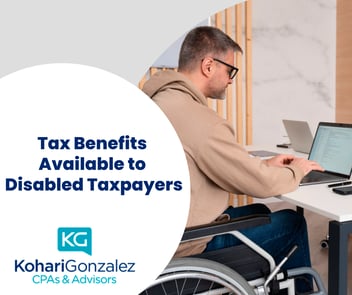 Article Highlights:
Article Highlights:
- Special Schooling
- Learning Disabilities
- Non-Hospital Institutions
- Medical Conferences
- Auto Travel
- Trips
- Meals
- Lodging
- Vehicle Modifications
- Drug Addiction
- Home Modifications
- Childcare Credit
- Nursing Services
Tax regulations offer families with children with special needs or disabilities the chance to save a significant amount of money during tax season. In addition to standard medical costs, parents may also benefit from the following list of tax-deductible charges.
Special Schooling
The cost of tuition for a kid with learning difficulties to attend a school that helps them overcome their impairments and acquire social and academic skills that are adequate is deducted as a medical expenditure. Parenting a kid with learning challenges can be extremely expensive, but the tax code may provide some relief by providing a deduction for the educational expenses of raising such a child.
Nevertheless, this expense is only deductible, together with other eligible medical costs, to the extent that the total medical costs for the year exceed 7.5% of the taxpayer's adjusted gross income.
In order to qualify for future regular schooling or normal life, a person requiring medical care may also need to pay for the expense of attending a special school intended to help them overcome a physical disability. This includes a school that teaches lip reading or Braille. The particular resources for mitigating the disability must be the primary motivation for attending.
As part of the medical costs, the cost of the school's provided food and housing as well as the tuition for regular education that is incidental to the special services, are also included. The core curriculum of a special school sets it apart from other educational institutions. While regular education may be offered, only if it is ancillary to the school's main goal of helping pupils overcome or compensate for their disabilities, would it be acceptable?
A school is considered a "special school" if it employs unique teaching methods to help its pupils overcome their conditions, and if the child's enrollment at the school was primarily motivated by these methods and the care provided by other staff members. As a result, the child's school tuition is deductible in the years that the child's medical condition that interferes with his capacity to learn is diagnosed.
The cost of the special program or special treatment (but not the whole tuition) may still be deductible medical expenses if the school a kid with a medical condition attends does not qualify as a special school since the regular education is not ancillary to the unique services offered.
Non-Hospital Institutions
The following instances of when costs for non-hospital institutions are deductible are drawn from Tax Court decisions or IRS rulings:
- The taxpayer has paid the full cost of keeping his mentally ill son in a private home that was carefully chosen and approved as a "institution" by the psychiatrist overseeing the son's case. This is done to help the son transition from a mental hospital to life in the community.
- Meals and housing in a hotel, where the taxpayer stayed and got nurse care, following an episode of appendicitis, hospital surgery, and release from the hospital due to the necessity for his hospital room. While the taxpayer resided in Milwaukee, all of these occurrences happened in New York. The attending physician stated that the taxpayer was too weak to return home at the time of his release.
- sums spent on room and board in a halfway home in order to support a child. Prerequisites for admission to the halfway home included a psychiatrist's recommendation and ongoing mental health care for the duration of the stay. A doctor and a mental health counselor were on duty at the residence.
Medical Conferences
The IRS has decided that taxpayers can claim a tax deduction for conference expenses related to a dependent's illness or disability. This opinion permitted the taxpayer to deduct the conference registration fee and travel expenses because the taxpayer's presence was necessary for the medical treatment of a dependent, and those expenses were largely for that care. Because the dependent did not get medical care at a facility that is licensed, which is a requirement for the medical deduction of meals and lodging, the expenditures of the meals and lodging were not deductible.
Auto Travel
Deductions are permitted for the actual cost of petrol and oil (not repairs, maintenance, depreciation, leasing fees, etc.) or a predetermined rate (cents per mile) in 2024 (down from 22 cents per mile in 2023) when driving a vehicle for medical purposes.
Trips
If the journey is primarily for, and necessary for, getting medical care, then the money paid for transportation to another city may be included in the medical expenditures. Lodging may be included for up to $50 per night. Even if a doctor recommends a trip, a vacation taken only for the purpose of changing scenery, boosting spirits, or generally improving health cannot be deducted from medical costs.
Meals
If receiving medical care is the primary reason for visiting a hospital or other comparable establishment, then 100% of the cost of meals may be covered by medical expenditures. Meals that are not included in the inpatient treatment may not be covered by insurance.
Lodging
If receiving medical treatment is the primary purpose for visiting a hospital or comparable establishment, then the expense of meals and accommodation may be covered. The cost of accommodation outside of a hospital or other comparable facility may also be included in medical expenditures. If all of the following conditions are satisfied, the price of such housing while traveling may be covered:
- The lodging facility is mostly needed for and necessary for medical treatment.
- A licensed physician is providing the medical care in a licensed hospital, or in a facility that is affiliated with or comparable to a licensed hospital.
- The accommodations are not ostentatious or opulent for the situation.
- Traveling far from home does not significantly include any personal enjoyment, leisure time, or vacation.
The maximum amount that can be deducted from each person's housing reimbursement for medical expenditures each night is $50. Because they are traveling with the patient getting care, lodging is covered for those whose transportation costs are considered medical expenses. For instance, housing costs up to $100 per night are covered as medical expenses if a parent is traveling with a sick kid. Meals are not written off.
Vehicles & Vehicle Modification
The cost of installing hand controls and other specialized equipment in a car so that a person with a handicap may operate it is included in medical expenditures. The difference between the price of a standard automobile and one that is specifically made to accommodate a wheelchair is also included in medical expenditures.
Drug Addiction
The amount a taxpayer pays to keep a dependent in a treatment facility for drug addicts, including the cost of the dependent's housing and meals, is deducted from their income.
Home Modifications
If the primary reason for paying for modifications or special equipment put in the home is to provide medical treatment for the taxpayer, spouse, or dependent, then the amount paid for such items may be included in medical costs. One may deduct a portion of the cost of permanent modifications from their medical expenses if they raise the property's worth. The rise in the property's value offsets the improvement's expense. The cost of medical care makes a difference. The whole amount is recognized as a medical expense if the improvement does not raise the value of the property. It is advised that an experienced expert be hired to do the evaluation in this case.
For the majority of medically connected home renovations, the tax laws do not need a prescription from a physician; but, in the event that the IRS questions the taxpayer, they must be able to show a clear connection between the expense and the dependent's medical treatment. Additionally, it would be easier to demonstrate a medical need if the patient had a letter from their physician outlining the kinds of adjustments that would be medically helpful.
Medical care only includes reasonable expenses to modify a residence to suit a handicapped condition. Expenses incurred for non-medical purposes, such architectural or aesthetic ones, are not considered medical charges.
Childcare Credit
Certain taxpayers are eligible to get a tax credit for the costs they expend to care for a child or other dependent while they are working for a living or looking for work. Earned income is the only amount of costs that can be deducted from the credit calculation. The expenditure is capped at the lower-paid spouse's earned income for taxpayers filing joint returns. Depending on the income of the parents, the credit is a percentage (20% to 35%) of the annual daycare costs (up to $3,000 for one kid and $6,000 for two or more). The credit decreases as income increases.
Nursing Services
Medical costs may include wages and other payments made for nursing services. If the services are of the type typically provided by a nurse, then a nurse need not provide them. This covers bathing and grooming as well as services related to managing the patient's health, such changing bandages or administering medicine. These services might be rendered in a different type of care facility or at home. In-home care providers are often regarded as workers, and the employing taxpayer is responsible for making the necessary payroll tax forms and payments. As an alternative, caregivers might be employed via a company that manages all the documentation.
Please contact our office with any questions you may have about these or other medical deductions.



